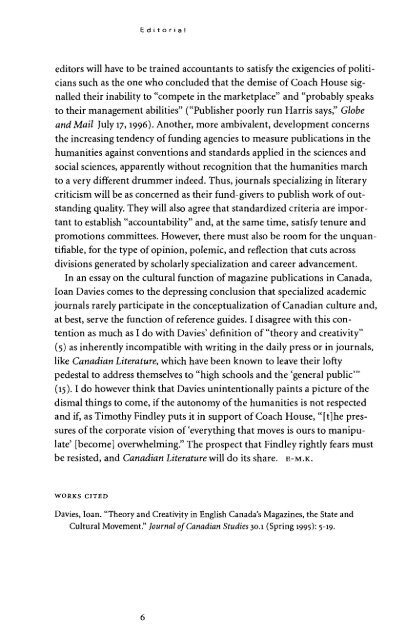Jean Rivard - University of British Columbia
Jean Rivard - University of British Columbia
Jean Rivard - University of British Columbia
Create successful ePaper yourself
Turn your PDF publications into a flip-book with our unique Google optimized e-Paper software.
Editorial<br />
editors will have to be trained accountants to satisfy the exigencies <strong>of</strong> politicians<br />
such as the one who concluded that the demise <strong>of</strong> Coach House signalled<br />
their inability to "compete in the marketplace" and "probably speaks<br />
to their management abilities" ("Publisher poorly run Harris says," Globe<br />
and Mail July 17,1996). Another, more ambivalent, development concerns<br />
the increasing tendency <strong>of</strong> funding agencies to measure publications in the<br />
humanities against conventions and standards applied in the sciences and<br />
social sciences, apparently without recognition that the humanities march<br />
to a very different drummer indeed. Thus, journals specializing in literary<br />
criticism will be as concerned as their fund-givers to publish work <strong>of</strong> outstanding<br />
quality. They will also agree that standardized criteria are important<br />
to establish "accountability" and, at the same time, satisfy tenure and<br />
promotions committees. However, there must also be room for the unquantifiable,<br />
for the type <strong>of</strong> opinion, polemic, and reflection that cuts across<br />
divisions generated by scholarly specialization and career advancement.<br />
In an essay on the cultural function <strong>of</strong> magazine publications in Canada,<br />
loan Davies comes to the depressing conclusion that specialized academic<br />
journals rarely participate in the conceptualization <strong>of</strong> Canadian culture and,<br />
at best, serve the function <strong>of</strong> reference guides. I disagree with this contention<br />
as much as I do with Davies' definition <strong>of</strong> "theory and creativity"<br />
(5) as inherently incompatible with writing in the daily press or in journals,<br />
like Canadian Literature, which have been known to leave their l<strong>of</strong>ty<br />
pedestal to address themselves to "high schools and the 'general public'"<br />
(15). I do however think that Davies unintentionally paints a picture <strong>of</strong> the<br />
dismal things to come, if the autonomy <strong>of</strong> the humanities is not respected<br />
and if, as Timothy Findley puts it in support <strong>of</strong> Coach House, " [t]he pressures<br />
<strong>of</strong> the corporate vision <strong>of</strong>'everything that moves is ours to manipulate'<br />
[become] overwhelming." The prospect that Findley rightly fears must<br />
be resisted, and Canadian Literature will do its share, E-M.K.<br />
WORKS CITED<br />
Davies, loan. "Theory and Creativity in English Canada's Magazines, the State and<br />
Cultural Movement." Journal <strong>of</strong> Canadian Studies 30.1 (Spring 1995): 5-19.

















